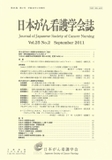Japanese
English
- 販売していません
- Abstract 文献概要
- 参考文献 Reference
要旨
本研究の目的は,終末期がん(肺・胃・直腸結腸)患者の予後予測項目に対する訪問看護師と病院看護師間の評価の相違を明らかにすることである.
独自に作成した予後予測項目を用いて,がん看護領域における臨床経験5年以上の看護師に質問紙調査を行った.協力が得られた訪問看護師27名,病院看護師17名を分析対象とした.
訪問看護師と病院看護師が適切と評価した予後10日の項目例は,肺がんで安静時の呼吸困難,胃がんで腹水貯留,直腸結腸がんで尿量減少/無尿であった.予後3日の項目例は傾眠と尿量減少/無尿で,肺,胃,直腸結腸がんすべてに共通した.両者が適切性を認めなかった予後10日と予後3日の項目例は褥瘡であり,肺,胃,直腸結腸がんすべてに共通していた.訪問看護師だけが適切と評価した予後10日の項目例は,肺がんで発語減少,胃がんでベッドから起き上がれない,直腸結腸がんで嚥下困難,予後3日の項目例は,肺がんで昏睡,胃がんで脈の緊張,直腸結腸がんで不整脈の出現であった.
訪問看護師と病院看護師の双方が適切と評価した項目は,がんの浸潤や身体機能低下等から生じる症状であり妥当性があると考える.両看護師間で異なる評価が出現したのは,療養の場で用いる機器や薬剤の違いが考えられる.シームレスケアを提供するためにも,両看護師がとらえる予後予測項目の相違に考慮して,情報を共有する必要がある.
Abstract
The purpose of this study was to clarify visiting and hospital nurses' evaluations of prognostic items for patients with terminal lung, stomach, and colorectal cancer.
Nurses with more than 5 years of clinical experience responded to an original questionnaire survey about prognostic items. Data were collected from twenty-seven visiting nurses and seventeen hospital nurses.
Prognostic items that were recognized as appropriate by both visiting and hospital nurses included: "dyspnea during rest"in patients with lung cancer; "ascites"in patients with stomach cancer and"oliguria/anuria"in patients with colorectal cancer as the ten-day prognosis. "Drowsiness"and"oliguria/anuria"in patients with terminal lung, stomach, and colorectal cancer were related to the three-day prognosis. Among the items that were not recognized as appropriate by both visiting and hospital nurses was"pressure ulcer", which was related to both the ten-day and three-day prognosis in patients with lung, stomach, and colorectal cancer.
The items that were recognized as appropriate only by visiting nurses included: "decreased talking" in patients with lung cancer; "bed bound"in patients with stomach cancer, and"dysphagia" in patients with colorectal cancer, which was related to the ten-day prognosis, and"coma"in patients with lung cancer,"strong pulse"in patients with stomach cancer, and"arrhythmia"in patients with colorectal cancer, which was related to the three-day prognosis.
Only the items that both visiting and hospital nurses recognized as appropriate were considered to have validity because these items were related to invasive cancer and reduced physical function. The differences in evaluations between visiting and hospital nurses might be related to variations in the availability of medical devices and medicine in homes and hospitals. To offer seamless care, it is needed for visiting and hospital nurses to consider their differences in determining the items and to share information about the patients.
Copyright © 2011, Japanese Society of Cancer Nursing All rights reserved.


